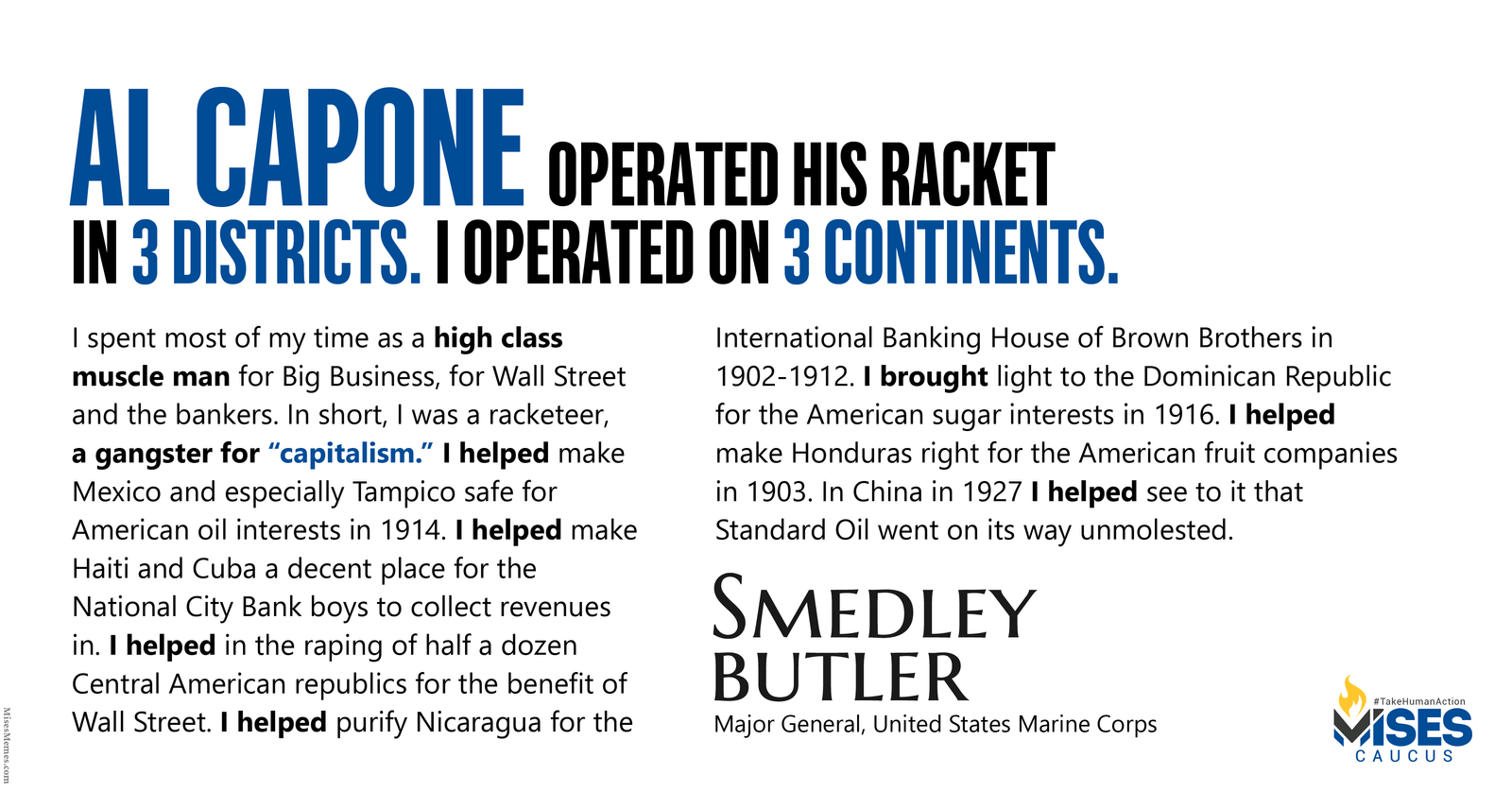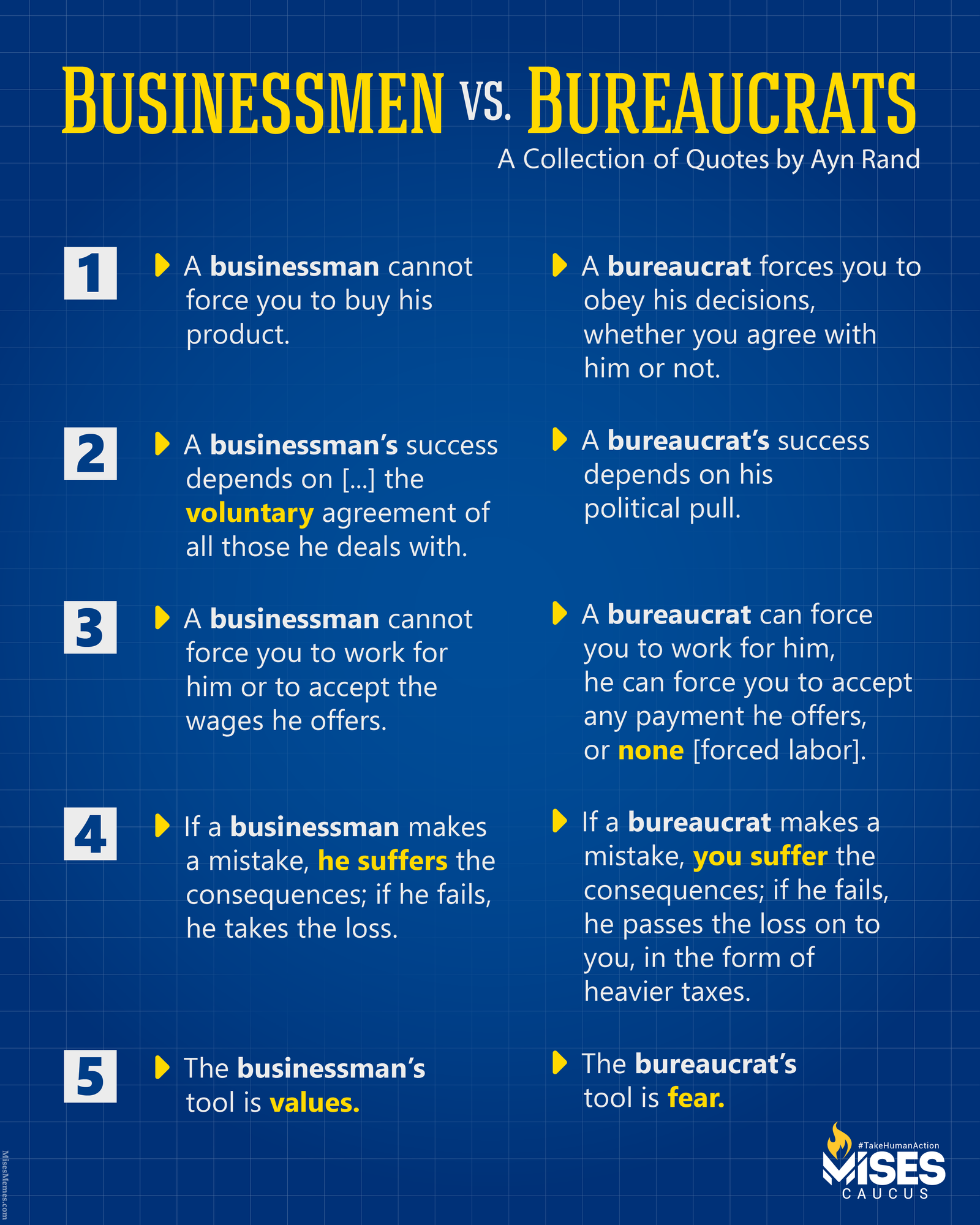The big difference between big government and big business is big government can take you to jail, or shoot you if you don’t comply. —Thomas Massie


The big difference between big government and big business is big government can take you to jail, or shoot you if you don’t comply. —Thomas Massie

If an employer has an opening that pays $50,000 in salary, and the Christian applicant will bring in $51,000 in extra revenue to the firm while the Muslim applicant will bring in $55,000, then to discriminate against the creed of the latter will cost the employer $4,000 in potential profits. Discrimination is automatically “fined” in the free market. — Bob Murphy

I spent 33 years and four months in active military service and during that period I spent most of my time as a high class muscle man for Big Business, for Wall Street and the bankers. In short, I was a racketeer, a gangster for capitalism. I helped make Mexico and especially Tampico safe for American oil interests in 1914. I helped make Haiti and Cuba a decent place for the National City Bank boys to collect revenues in. I helped in the raping of half a dozen Central American republics for the benefit of Wall Street. I helped purify Nicaragua for the International Banking House of Brown Brothers in 1902-1912. I brought light to the Dominican Republic for the American sugar interests in 1916. I helped make Honduras right for the American fruit companies in 1903. In China in 1927 I helped see to it that Standard Oil went on its way unmolested. Looking back on it, I might have given Al Capone a few hints. The best he could do was to operate his racket in three districts. I operated on three continents. —Smedley Butler, Major General, United States Marine Corps

In 1990, the U.S. government enacted the Americans with Disabilities Act. This law attempted to protect the disabled in the labor market by prohibiting discriminatory behavior on the basis of disability. A law specifically designed to ensure that the disabled got a fair shake in the labor market instead resulted in decreased employment rates for the disabled.
Why? There are a couple of reasons. First, the law made it expensive for businesses to hire the disabled. Regulators have deemed, among other things, that employers will need to modify an employee’s physical environment, offer the employee additional training, give him extra time to complete tasks, and even hire interpreters. All these things increase the cost of doing business.
Second, the law made it difficult to terminate disabled workers, even when warranted. But how is a business to prove that it terminated a disabled worker because of something other than the worker’s disability? The answer that many businesses seem to have arrived at, although few will admit it, is not to hire the disabled in the first place.
It turns out to be easier for an employer to prove that it did not hire a disabled worker for a reason unrelated to the worker’s disability than to prove that it fired the worker for such a reason. Consequently, the Americans with Disabilities Act actually led to a decrease in employment rates for the disabled.
—Antony Davies, James R. Harrigan

A young drug dealer once asked for a job on a public housing project in San Francisco. He approached Chris Albert, president of Willie Electric Company, hoping to get out of drugs and into legitimate work.
Unfortunately, because of the high wages dictated by the minimum wage law, the contractor couldn’t afford to take a chance on an unskilled man with no job record. The young man came back two days later and begged to be employed at a lower wage. “I won’t tell the law,” he promised.
“I want to make a better life for me and for my mom, and for my little sisters and brothers.” Unwilling to risk legal problems, the contractor reluctantly refused.
Two days later the young man was shot and killed. Maybe he’d be alive today if the minimum wage laws had not prevented him from working instead of being on the streets.
—Mary Ruwart, Healing Our World

Nobody in the drug industry is going to say anything because if they do the FDA could punish them by dragging their feet on their approvals, which could destroy a company, and it has destroyed many. So no one is going to speak out. —Dr. Mary J. Ruwart

Libertarianism is rejected by the modern Left, which preaches individualism but practices collectivism. Capitalism is rejected by the modern Right, which preaches enterprise but practices protectionism. —Karl Hess (The Death of Politics)

A businessman’s success depends on his intelligence, his knowledge, his productive ability, his economic judgment—and on the voluntary agreement of all those he deals with: his customers, his suppliers, his employees, his creditors or investors. A bureaucrat’s success depends on his political pull. A businessman cannot force you to buy his product; if he makes a mistake, he suffers the consequences; if he fails, he takes the loss. A bureaucrat forces you to obey his decisions, whether you agree with him or not—and the more advanced the stage of a country’s statism, the wider and more discretionary the powers wielded by a bureaucrat. If he makes a mistake, you suffer the consequences; if he fails, he passes the loss on to you, in the form of heavier taxes.
A businessman cannot force you to work for him or to accept the wages he offers; you are free to seek employment elsewhere and to accept a better offer, if you can find it. (Remember, in this context, that jobs do not exist “in nature,” that they do not grow on trees, that someone has to create the job you need, and that that someone, the businessman, will go out of business if he pays you more than the market permits him to pay you.) A bureaucrat can force you to work for him, when he achieves the totalitarian power he seeks; he can force you to accept any payment he offers—or none, as witness the forced labor camps in the countries of full statism.
The businessman’s tool is values; the bureaucrat’s tool is fear.
—Ayn Rand
A businessman’s success depends on his intelligence, his knowledge, his productive ability, his economic judgment—and on the voluntary agreement of all those he deals with: his customers, his suppliers, his employees, his creditors or investors. A bureaucrat’s success depends on his political pull. A businessman cannot force you to buy his product; if he makes a mistake, he suffers the consequences; if he fails, he takes the loss. A bureaucrat forces you to obey his decisions, whether you agree with him or not—and the more advanced the stage of a country’s statism, the wider and more discretionary the powers wielded by a bureaucrat. If he makes a mistake, you suffer the consequences; if he fails, he passes the loss on to you, in the form of heavier taxes.
A businessman cannot force you to work for him or to accept the wages he offers; you are free to seek employment elsewhere and to accept a better offer, if you can find it. (Remember, in this context, that jobs do not exist “in nature,” that they do not grow on trees, that someone has to create the job you need, and that that someone, the businessman, will go out of business if he pays you more than the market permits him to pay you.) A bureaucrat can force you to work for him, when he achieves the totalitarian power he seeks; he can force you to accept any payment he offers—or none, as witness the forced labor camps in the countries of full statism.
The businessman’s tool is values; the bureaucrat’s tool is fear.
—Ayn Rand

Capitalism gave the world what it needed, a higher standard
of living for a steadily increasing number of people. —Ludwig von Mises

The business cycle is brought about, not by any mysterious failings of the free market economy, but quite the opposite: By systematic intervention by government in the market process. Government intervention brings about bank expansion and inflation, and, when the inflation comes to an end, the subsequent depression-adjustment comes into play. —Murray Rothbard